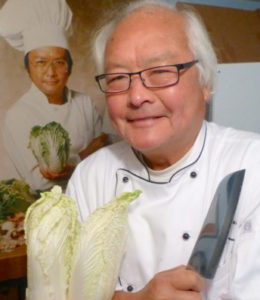Wok & Roll by Peter Kwong, (Frederic) Inter-County Leader
» Download this column as a Word document
Recently I had the opportunity to watch the 25th-anniversary celebration of “Les Miserables” on YouTube. I am still mesmerized by the whole production — the acting, the singing, the storyline, the setting and all the songs. Not only is the melody noteworthy and easy on the ears but also the lyrics are so potent and prevailing.
I took my kids once to watch a live performance when the show came to Milwaukee; and I even went and got myself a cassette afterward, and played the songs over and over. I could sing along to some of them, even though I didn’t know the words.

When the movie came out a few years ago, needless to say, I went to see it with my wife. But somehow, I was a bit disappointed. Even though it was a great production, with expensive costumes and an all-star cast, somehow, I like the theater version better. So, bigger doesn’t mean it is better, no!?
The background of the story happened in France during the French Revolution. The novel was written by Victor Hugo, who also wrote many other novels. But the only one that I am familiar with is “The Hunchback of Notre Dame.”
I had never been fond of novels while growing up. I was hooked on kung fu novels more than anything else. The only reason that I heard of “The Hunchback of Notre Dame” is that I saw the movie when I was a kid.
Hey, it is never too late to learn new things, right?
Anyway, there are so many wonderful songs in the play — “I Dreamed a Dream,” “On My Own” — one of my favorites, along with “One More Day.” But my most favorite is sung by the revolutionary students, “Do You Hear the People Sing?” It just stirs my blood every time I hear the song:
“Do you hear the people sing?
Singing the song of angry men?
It is the music of a people
Who will not be slaves again
When the beating of your heart
Echoes the beating of the drums
There is a life about to start
When tomorrow comes.”
The young students, who had never been trained in combat, were picking up rifles to fend off the advancing French army. They had little ammunition left, and were hopelessly outnumbered; yet they still stayed behind the hastily made barricade, doing what they thought was right for themselves and their countrymen. The song touches my heart in so many ways, and every word of that song reflects the message.
Even though they knew the situation was hopeless, no one walked away. As the beating of the heart echoed the beating of the drums, they kept giving what they could give, so that the banner might advance; knowing well that some of their comrades would fall and not be able to see another daybreak.
History repeats itself, all over time, and all over the world. Why would there be revolutions if all the people are happy and lived a stable and healthy life? The ruling class — kings, emperors, czars, etc., would have nothing to do with taking care of their people.
Common folks were tired of suffering, and finally, they had no choice but to fight, to revolt, and to demand a change. Change is an ugly word, as no one wants changes; except that it has become inevitable that only change can bring freedom, a better place to be, and a worthier place to live. However, just with courage alone, could the students accomplish that?
The live anniversary performance must have been done in a large stadium, as with the cast, the orchestra, the backup singers, and the sold-out crowd, there must be over 50,000 or more people — and thank goodness the pandemic hadn’t hit yet.
The plot was explicated in songs, and each song would tell a story as the scenario developed. The lead singer(s) who dressed in costume, would take turns in singing to continue the plot. And then when it came to “Do You Hear the People Sing?” something dramatic happened.
With only the music playing, there were singers marching in from the back entrance. Each singer was accompanied by a flag carrier, indicating the national origin of the singer. There must have been at least 15 singers, and each represented their own country — Finland, Sweden, Germany, France, Australia, Japan, USA, England, etc. Each one would sing a verse of the song in his native language. And the grand finale at the end was everyone would sing the last verse together in English — the singers, the cast and the chorus.
“When the beating of your heart
Echoes the beating of the drums
There is a life about to start
When tomorrow comes
When tomorrow comes.”
What a way to bring the house down! Come to think of it, our Indianhead Chorus did sing that song in one of our concerts, and the audience just loved it. Of course, we only had 30 singers on stage, and couldn’t compete with the 500 singers they had.
I am a sentimental fool, as I cried listening to “Puff the Magic Dragon” playing in concert. And guess what happened when we sang “Do You Hear the People Sing?” at our concert? Yes, you guessed it. I couldn’t finish the song as sand got in my eyes; and it happened to a lot of us, too.
Yes, we’re all getting old, but we’ll keep on singing and share our joy and passion with you all.



